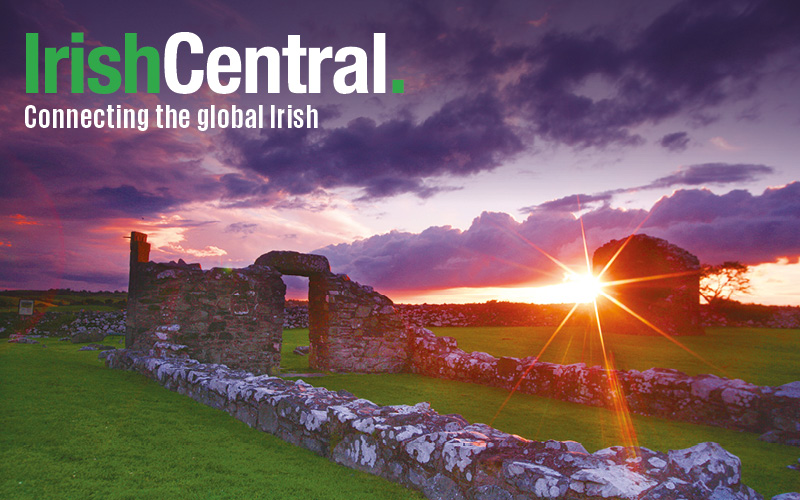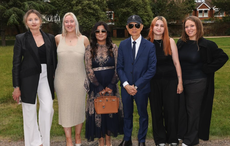Denis O’Brien, (54), is Ireland’s most successful businessman and biggest philanthropist. He created Digicell, one of the most successful cell phone companies in the world.
In addition he has a vast media empire but is as well known for his philanthropy, especially in the Third World as his business acumen.
Last week was a good one for O'Brien in New York. Former president Bill Clinton, a close friend, had written in a Time Magazine cover story that his move to make cash transactions available for the poorest in the world via cell phones was the number one idea in changing the world last year.
He had also just received a corporate philanthropic award from the Clinton Global Initiative at their annual meeting. In addition, Forbes Magazine came out with their Richest 400 list and he was rated at number 205 with a $5 billion fortune.
He had just come from a small dinner with President Clinton and Carlos Slim, the Mexican billionaire and the world's richest man and a few other heavyweights the night before we met and he described with evident relish, how the evening had ended with a few spontaneous songs from all concerned. He makes it clear that his philanthropic work is taking more of his time these days and that Ireland's problems are never far from his mind.
O’D: Tell me, how does it feel to be named in a cover story in Time magazine as making the most difference out of anyone on earth in the last year – by Bill Clinton of all people?
O’B: Well look, you know, it was generous, it was extremely generous of him. It certainly doesn’t feel like that because, you know, everybody is doing their bit in Haiti. There are so many people doing projects – small projects, big projects – there are thousands of people trying to help Haiti at the moment
O’D: How did you come up with this idea of people being able to send money by cell phone?
O’B: Well, they’ve been doing it in Africa for many years, but nobody has really turned it into a commercial proposition yet, So, you know, we have four beta tests at the moment. Well, Haiti now has gone beyond beta tests, but Haiti was the number one, and then Tonga, Papua New Guinea, and also Samoa.
O’D: So, tell me about Bill Clinton. What do you think?
O’B: [Laughs.] You know, his best snippet from last night was, he said “the weight of ants is more than the weight of human beings in the world today.” He was weaving this thing together… He always surprises, and he gets more and more interesting. And the Clinton Global Initiative is the real model because everybody goes to (CGI) , and we all have a good chat and we head home. We learn a few things. But if you go to the CGI, number one you’re making a promise and you have to deliver on it. And what he’s done is he’s used all of his contacts around the world and he’s corralled them all to do something good. He is beloved here If he could run for election tomorrow he’d be in at 60, 65%.
But his engagement in Ireland is critical. I mean, talk about having an ally. Think about all the countries in the world, there are two-hundred and something countries in the world, to have an ally like Bill Clinton. He’s a great advocate for Ireland and has such a great mind.
He was Google before they invented Google, and he still is Google.
O’D:Why was he so enamoured of your idea?
O’B: 95% of people are unbanked in Haiti, for example. In Papua New Guinea it’s probably even more. So now for the first time people can have money, save money, without having to put cash under a bed or hide it somewhere.
They have a pin code so nobody can access that cash and it’s totally secure.
O’D: Looking back, what was the moment when you said, “I’m going to go there, to the underdeveloped countries, the path not taken by so many others?
O’B: It wasn’t really that brilliant, because if you see a country today and only 10% of the people have a mobile phone, every other country in the world is at 70. 80% – some are at 100%. So, I mean, it’s going to go there, it’s going to go in that direction. It’s a matter of having the best combination of things in your proposition: a good network, good prices, and a good team and good marketing. So we just rolled out teams – mainly Irish people – who put this into effect in country after country. Now we have local managers, who we have trained up. So we probably have, worldwide, still about 200 senior Irish managers sprinkled all over out operations.
Burma is like – there are only 2 million people who have cell phones there and there are about 63 million people in the country. So the only 3 places left in the world where phones are needed, where somebody needs to bring a network to them, are North Korea, Cuba and Myanmar [laughs]. That’s it!
O’D: What’s next?
O’B: I think, the next thing is this: If you take all our mobile phone customers, they’re all eventually going to go on the internet, and many of them already have. We’ve built 4G networks in 15 of our countries, and everybody now is buying smart phones. So it’s a completely different revenue stream
And I’m sure in another few years there’ll be another major jump in an opportunity that will be attached to a cell phone.
O’D: Let me ask you about the Irish diaspora,. Do you think the potential is tapped in Ireland, or do you think people fully comprehend?
O’B: Well, do you know, I was so disappointed with the Institute of Directors when several Irish American business leaders offered to serve on Irish boards
Their chief executive came out and said ‘We do not need these people, you should be appointing people in Ireland who have expertise in Ireland to the boards, we don’t need people from the States.”
And I thought, that is just such a closed mentality. You know, Ireland is globalized now and there are so many talented people in the diaspora who have something to commit. You take a guy like Craig Barrett – you say Holy God, he is one of the iconic figures of the information age CEO of Intel and he’s the perfect guy to bring in your board.
So why would you rule out the opportunity to bring in a Craig Barrett for any business in Ireland, any state-owned company?
O’D: What other areas do you see the diaspora being helpful in?
You know, there’s so many Irish Americans who have had a real experience of crisis – financial crisis or whatever. Many of them worked on Wall Street, many of them were in government, and it’s just a matter of tapping them.
Maybe it’s too late now because most of the steps have already been taken by the government, but if you were back in 2008 again, you wouldn’t be ringing Merrill Lynch, you’d be ringing 3 or 4 Irish American guys like Adrian Jones at Goldman Sachs who you’d have on a list as your crisis cabinet.
O’D: What do you see when you look at Ireland now?
O’B I’m positive, There’s recognition in Wall Street here, writers on what is happening in Europe are saying basically Ireland has taken its medicine in a serious, serious way. You know, they’re still fighting away in Greece about what they’re going to do, whether it’s going to be 11 or 12 billion, and it’s really an academic argument at this stage about whether or not you’re going to do it. So Ireland has taken all its medicine.
O’D: So you’re happy that Ireland is going to deal with its problems?
O’B: Well, we’re well, well past the point of return now, and we have been the model country in terms of handling our problems. Everybody else has done a bit but not enough, and you can never do enough in this area.
O’D: Do you ever look at something like the Forbes 400 list, see your name on it and say, “Who’s this guy? How did I get here?”
O’B: [Laughs] Not really, not really, no.
O’D: Where does your acumen come from? Was it your parents?
O’B: You know, I think all business acumen comes from… I’d like to think it comes from the farming background.
O’D: Right, buying and selling.
O’B: Buying and selling. My mother, both my parents, my father was born in Cork but my mother was born to a farming background in Armagh. My whole father’s side of the family came from a small farming background, and I think that is where it comes from. City kids miss that.
O’D: What is it, going to the fair?
O’B: Yeah, going to the fair, looking at that whole thing of trade – when do you sell, when do you buy, the whole emotional intelligence. If you go to a mart you’ll learn an awful lot, it’s like a life’s education in a day.
O’D: Is that what you did with your dad?
O’B: No, I didn’t really, but I would have gone to Tandragee in Armagh and they had a chicken farm at that stage, you know what I mean? So I understand what’s the price this week for eggs and so on.
When I look at managers, some of our best new managers in Digicel come from Kerry; they come from country, hard-livings.
And I look at kids today in, say Dublin, and they’re the 4x4 generation. They don’t have that toughness. I think physical toughness transfers into business and you become more resolute if you’ve had a harder upbringing.
And, you know, now there’s probably no science to what I’m saying, but it’s just kind of my instinct. I listen to presentations in Digicel and these tough country guys are up talking about what’s going on, and it might be a tough market, so you need these men. In fact some of our harder markets, we put the mountainy men in!
O’D: When I told a couple of people I was interviewing you, they had the same question: Is he going to keep paying Trapattoni the Irish soccer manager ?(Denis O’Brien allowed Trapattoni to be hired by underwriting his salary)
O’B: Well I am, I have a gentleman’s understanding with John Delaney. Look, we need to be realistic. I went to all three games in Poland and it was a fantastic atmosphere. I know everyone was beating back home about how we got killed, but look, we were up against the two finalists and Croatia, who are one of the best central European footballing nations. But obviously the team did not perform to its ability and you have to ask why – was it because they were tired? Was it because they were in camp for too long? But at the end of the day Trappatoni is a hell of a manager. He got us there, he nearly got us to the World Cup only for a handball, and the fact that he got us all the way to the European Championships is a great achievement.
O’D: Where does your philanthropic gene come from?
O’B: Everybody in Ireland has a philanthropic gene. As you were raised in Ireland in the ‘60s, ‘70s, ‘80s. everybody was collecting for something. There was always a tin somewhere. If you go into a shop in Ireland there are always at least 3 tins – there could be 5 in the west of Ireland.
O’D: Some people worry that after Chuck Feeney’s foundation is paying itself down there will be nothing left . What’s left when Atlantic Philanthropy leave Ireland?
O’B: Philanthropy in Ireland is different to here. Here people do it for tax reasons and they do it because they feel good about it and it’s very public. It’s a big bang approach to philanthropy. In Ireland there are certain levels, like large-scale philanthropy, and then the next level down, but people don’t really advertise it.
They’re not interested in getting a photo with a big check for a university or whatever. I’m involved in fundraising for UCD. There’s an incredible amount of philanthropy that has supported UCD and the reforms that President Hugh Brady has made. It’s the same in Limerick, and it’s the same all over the country. So people say, “Oh, there isn’t much philanthropy in Ireland…” There is, but it’s quieter..
O’D: People in Ireland – some people here too – complain about all the negativity, they have the view that everything that is reported in the media is overly negative
O’B: Well, there’s a lot of hare coursing of people in Ireland. People in political life made mistakes, people in political life have made mistakes, but it’s just a constant, constant theme of chasing them, photographing them, following them, putting them on the front page. And that kind of negative journalism… I mean, look, these people made mistakes. But they are also human beings. Remember that. I thought chasing Brian Cowen to some university in California was an appalling thing to do.
He’s out of public life, he’s a private citizen. Leave him alone. That would be my view. So I think we need to stop it. And it’s mainly in the print media, and we need to move forward, Yes, in all of this there should be a light shone on it, but we can’t keep regurgitating the same negative personal stuff–
O’D: What about the future of newspapers ?
O’B: Integrating a parallel online business to your existing print business, is where everybody has to go. We’re doing that in radio, we have to do it with newspapers in INM, from a very, very low base. So there’s a lot of effort to do that, which heretofore nobody believed in. The old board of INM just didn’t believe in the Internet, which is pretty startling when everything else is changing in the world.
It’s like saying oh, nobody is going to buy a smart phone tomorrow.
So that has to happen.
It’s going to be a very painful process for INM for the next 2 or 3 years. And it may not get here. I’m a realist to think that the business has so many challenges, mainly from a banking point of view, that it may not… we’re at the mercy of our banks at the moment because we’ve too much leverage and a declining profitability profile. We have a new CEO that everybody believes in, we have a new chairman in Leslie Buckley, and you couldn’t get a better person, but my God it’s going to be a huge struggle.
We’re late in to the field and now we’re doing what we should have done 6 or 7 years ago.
But look, it’s not all bad, and some great people work fort INM, it’s just how do you turn a whole ship around and motor as quick as you can?
story.
O’D What needs to be done to improve Irish economic prospects?
O’B: What we need is more investment, We need more investment in the SME side, with small businesses. How do you take medium sized businesses and turn them into multinationals? That is the key.
And how can you persuade Irish entrepreneurs to hang in there, come to Wall Street, raise some money and keep going. And how do you create the next multinational like Smurfit, Cappa, CRH, whoever the hell it is, out of Ireland? That’s the real trick here. And I know Enterprise Ireland, it kills them to see Irish companies being sold, having nurtured them, the whole team working with businesses.
And the other thing, if you take our relationship with the Unites States, we need to develop – and we’ll probably never develop the same relationship – but we need to develop a different kind of relationship towards China. And still I think that we need a minister for China. It could be a junior minister, but we need a minister for China and indeed a minister for the diaspora.
Denis O’Brien thank you




Comments